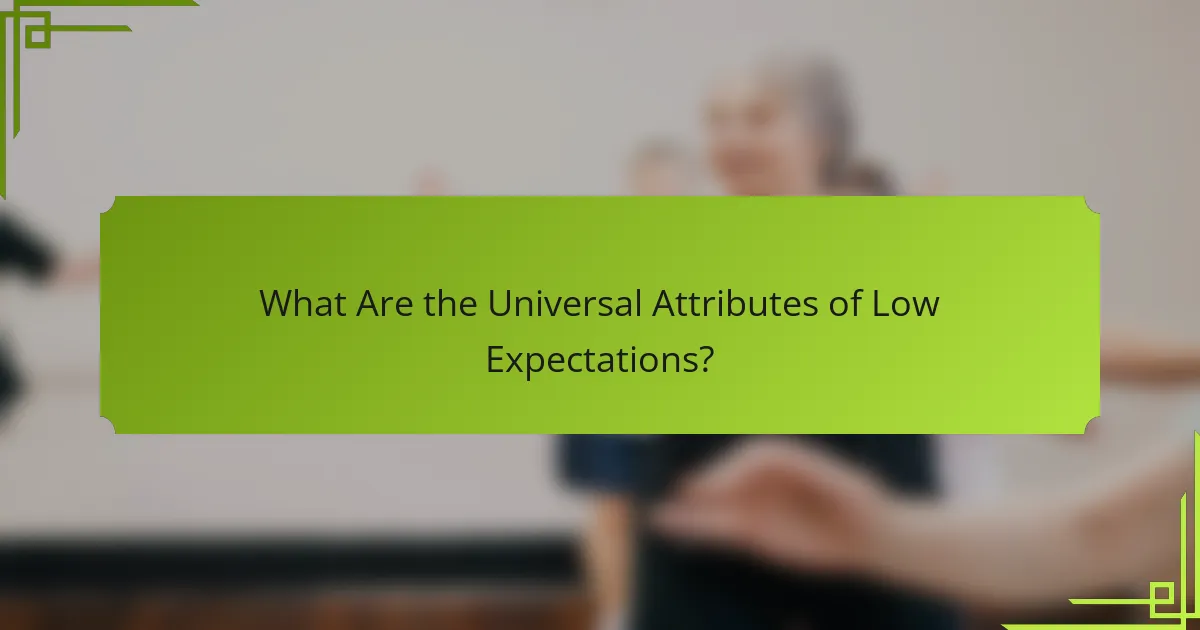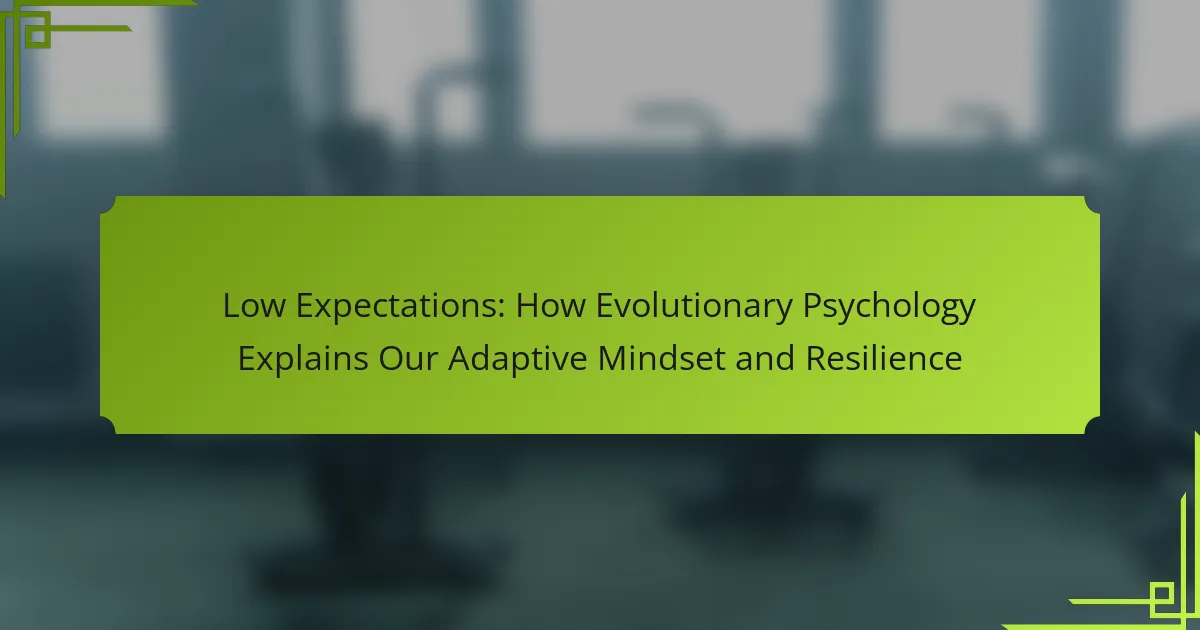Low expectations can enhance resilience and adaptability, helping individuals cope with challenges more effectively. This mindset reduces pressure, fosters emotional stability, and encourages personal growth. The article explores how low expectations serve as a psychological buffer, their impact across various contexts, and their connection to cognitive flexibility and creativity. Understanding these dynamics can lead to improved mental health and a proactive approach to life’s uncertainties.

What are Low Expectations and Their Role in Evolutionary Psychology?
Low expectations serve as a psychological mechanism that enhances resilience and adaptability in evolutionary psychology. They enable individuals to cope with challenges by reducing the pressure to meet high standards. This mindset fosters a greater sense of contentment and encourages risk-taking behavior, as the fear of failure diminishes. Low expectations can lead to improved mental health outcomes, as individuals are less likely to experience disappointment and more likely to appreciate small successes. This adaptive strategy has evolved as a means of survival, allowing individuals to navigate uncertain environments effectively.
How Do Low Expectations Influence Our Adaptive Mindset?
Low expectations can foster an adaptive mindset by reducing pressure and enhancing resilience. This psychological approach allows individuals to navigate challenges more effectively. Research indicates that lower expectations can lead to increased adaptability, as individuals are less likely to feel overwhelmed by perceived failures. Consequently, this mindset promotes a growth-oriented perspective, encouraging people to learn from experiences rather than fear them. Embracing low expectations can ultimately enhance emotional resilience, enabling better coping strategies in the face of adversity.
What Psychological Mechanisms Underlie Low Expectations?
Low expectations often stem from psychological mechanisms that promote resilience and adaptability. Evolutionary psychology suggests that low expectations serve as a protective strategy, reducing disappointment and fostering a more manageable outlook on life. This mindset can enhance emotional stability, allowing individuals to navigate challenges without overwhelming stress. By setting lower expectations, people may experience more frequent positive outcomes, reinforcing their adaptive mindset. This unique attribute of low expectations aligns with survival instincts, as it encourages individuals to remain hopeful yet realistic in uncertain environments.
What Are the Benefits of Maintaining Low Expectations?
Maintaining low expectations can enhance resilience and satisfaction. This mindset helps individuals cope with challenges by reducing disappointment and fostering adaptability. Research shows that low expectations can lead to greater emotional stability and improved mental health outcomes. By setting achievable goals, people are more likely to experience positive outcomes, reinforcing a sense of accomplishment.
How Do Low Expectations Foster Resilience in Challenging Situations?
Low expectations can enhance resilience by reducing pressure and allowing individuals to adapt to challenges more effectively. This mindset fosters a sense of safety, enabling people to approach difficulties with flexibility. Research in evolutionary psychology suggests that low expectations create a buffer against disappointment, encouraging persistence. As a result, individuals are more likely to develop coping strategies that promote long-term resilience in the face of adversity.
What Unique Insights Does Evolutionary Psychology Provide on Low Expectations?
Evolutionary psychology suggests low expectations can enhance resilience by promoting adaptive strategies for survival. This mindset helps individuals navigate uncertainty, reducing the emotional impact of potential disappointments. By setting lower expectations, people can maintain motivation and cope better with challenges. This adaptive approach aligns with evolutionary principles, where flexibility in mindset fosters greater psychological well-being.
How Have Low Expectations Evolved as a Survival Strategy?
Low expectations have evolved as a survival strategy by enabling individuals to cope with uncertainty and adversity. This mindset reduces stress and enhances resilience, allowing for adaptive responses in challenging environments. Research in evolutionary psychology suggests that maintaining low expectations can lead to greater satisfaction and emotional stability, as individuals are less likely to face disappointment. This strategy reflects a unique attribute of human psychology, where adaptability is crucial for survival.

What Are the Universal Attributes of Low Expectations?
Low expectations can foster resilience and adaptability. They encourage a mindset that accepts challenges without overwhelming pressure. This perspective allows individuals to focus on incremental progress rather than perfection. Root attributes include reduced anxiety and increased motivation. Unique attributes involve the ability to learn from failures, enhancing personal growth. Rare attributes may encompass improved emotional regulation and better social interactions.
How Do Cultural Differences Shape Perceptions of Low Expectations?
Cultural differences significantly influence perceptions of low expectations by shaping beliefs and attitudes. For instance, collectivist cultures often emphasize community support, fostering resilience despite low expectations. In contrast, individualistic cultures may view low expectations as personal failure, impacting motivation. These diverse perspectives highlight the unique attribute of cultural context in understanding adaptive mindsets. As a result, individuals navigate challenges based on their cultural frameworks, affecting their response to adversity and shaping resilience strategies.
What Common Psychological Patterns Are Associated with Low Expectations?
Low expectations can lead to various psychological patterns, including pessimism, learned helplessness, and self-sabotage. These patterns often stem from evolutionary adaptations that prioritize risk aversion and survival. Individuals may develop a mindset that protects them from disappointment, resulting in reduced motivation and resilience. This adaptive strategy can hinder personal growth and fulfillment.

What Unique Attributes Distinguish Low Expectations in Different Contexts?
Low expectations can vary significantly across contexts, influencing behavior and resilience. In personal relationships, low expectations may lead to reduced disappointment, fostering emotional stability. In educational settings, students with low expectations might exhibit lower performance, as they underestimate their potential. In the workplace, employees with low expectations may lack motivation, hindering productivity. Conversely, in adaptive scenarios, low expectations can enhance resilience, as individuals prepare for less favorable outcomes. This adaptability reflects a unique attribute of low expectations, where they serve as a psychological buffer against stress.
How Do Specific Life Experiences Influence Low Expectations?
Specific life experiences shape low expectations by reinforcing adaptive mindsets. For instance, repeated failures can lead to a belief that success is unattainable, influencing self-perception and resilience. Evolutionary psychology suggests these adaptations are survival mechanisms, helping individuals cope with adversity. Social environments also play a role; supportive relationships can counteract negative experiences, fostering higher expectations despite past challenges.
What Role Does Personality Play in Shaping Low Expectations?
Personality significantly influences low expectations by shaping individual perceptions and responses to challenges. Traits such as optimism or pessimism dictate how a person interprets potential outcomes. For instance, individuals with a pessimistic personality may set lower expectations to avoid disappointment, thus impacting their resilience. This adaptive mindset aligns with evolutionary psychology, as individuals often develop strategies to cope with perceived threats. Understanding these personality dynamics can enhance approaches to personal growth and resilience building.

What Rare Attributes Are Associated with Low Expectations?
Low expectations are often linked to rare attributes such as cognitive flexibility, which allows individuals to adapt their beliefs based on new information. This adaptability fosters resilience, enabling people to cope with setbacks more effectively. Additionally, a low expectation mindset can enhance creativity, as it encourages exploration without the fear of failure. This unique perspective contributes to problem-solving and innovation.
How Do Low Expectations Impact Decision-Making Processes?
Low expectations can lead to poor decision-making by limiting perceived options and outcomes. This mindset often results in reduced motivation and engagement, ultimately hindering problem-solving abilities. Research indicates that individuals with low expectations may overlook opportunities for growth and improvement, leading to a cycle of stagnation. By fostering a more optimistic outlook, decision-making processes can become more adaptive and resilient, allowing for better choices and outcomes.
What Are the Long-Term Effects of Low Expectations on Mental Health?
Low expectations can lead to chronic low self-esteem and increased anxiety over time. Individuals may develop a mindset that limits their potential, reducing motivation and resilience. This mindset can perpetuate feelings of hopelessness and impact overall mental health negatively. Studies indicate that low expectations can create a self-fulfilling prophecy, where individuals do not strive for better outcomes, thus reinforcing their initial beliefs. The long-term effects include a diminished sense of agency and increased vulnerability to mental health disorders.

How Can We Apply Insights from Evolutionary Psychology to Manage Low Expectations?
Applying insights from evolutionary psychology can help manage low expectations by understanding their adaptive role in human resilience. Evolutionary psychology suggests that low expectations may stem from survival mechanisms, allowing individuals to cope with uncertainty and adversity effectively. This mindset can lead to greater emotional stability and adaptability in challenging situations. By reframing low expectations as a strategy for resilience, individuals can focus on realistic outcomes, thereby reducing disappointment and fostering a proactive approach to life’s challenges. Embracing this perspective encourages a more constructive response to setbacks, ultimately enhancing personal growth and well-being.
What Best Practices Can Enhance Resilience Through Low Expectations?
Low expectations can enhance resilience by promoting adaptability and reducing disappointment. Embracing a mindset that prioritizes manageable goals allows individuals to navigate challenges more effectively. This approach encourages a focus on incremental progress rather than unattainable perfection, fostering a sense of achievement.
Research indicates that people with low expectations are often more satisfied with outcomes, as they experience less stress and anxiety when facing setbacks. This aligns with evolutionary psychology, which suggests that adaptive mindsets are crucial for survival. By setting realistic expectations, individuals can cultivate resilience and maintain motivation in the face of adversity.
Additionally, practicing gratitude can further enhance resilience. Recognizing small victories and appreciating the present moment can shift focus away from negative outcomes. This positive reinforcement strengthens emotional well-being, enabling individuals to bounce back more readily from difficulties.
In summary, adopting low expectations fosters a resilient mindset, allowing for better adaptability, reduced stress, and enhanced emotional health.
What Common Mistakes Should Be Avoided When Adjusting Expectations?
To avoid common mistakes when adjusting expectations, focus on realistic assessments and avoid over-optimism. Many people underestimate challenges, leading to disappointment. Acknowledge potential obstacles and reassess goals periodically. Emphasizing adaptability enhances resilience, allowing for better management of unexpected outcomes.
How Can Individuals Cultivate a Balanced Mindset with Low Expectations?
Individuals can cultivate a balanced mindset with low expectations by embracing adaptability and resilience. Evolutionary psychology suggests that low expectations can lead to greater emotional stability and satisfaction. This approach allows individuals to navigate challenges with a focus on achievable goals.
By setting realistic expectations, individuals reduce the likelihood of disappointment and foster a more positive outlook. This mindset encourages appreciation for small successes, enhancing overall well-being. Additionally, low expectations can promote a sense of control, allowing individuals to respond effectively to life’s uncertainties.
Incorporating mindfulness practices can further support this mindset. Techniques such as meditation or journaling help individuals reflect on their thoughts and feelings, reinforcing a balanced perspective. Engaging in these practices regularly can strengthen resilience and adaptability in the face of challenges.
Ultimately, cultivating a balanced mindset with low expectations involves recognizing the benefits of flexibility and emotional awareness. This approach not only enhances personal growth but also contributes to a more fulfilling life experience.
